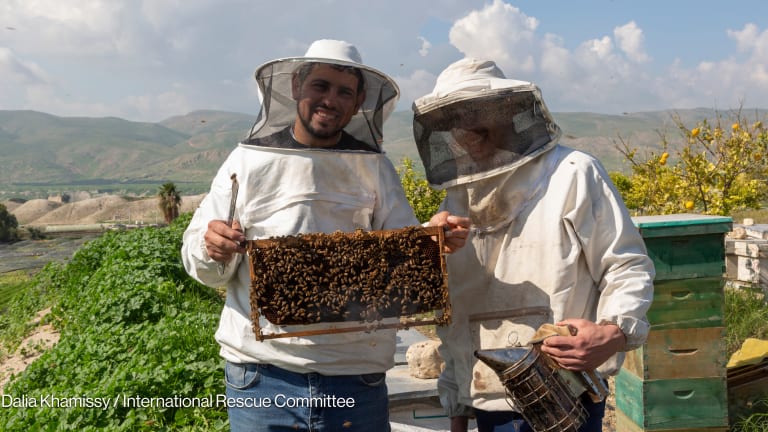
“I’ve been doing my work for six years now but I’ve never been approached by an agency looking at development.”
Julius Shirima, 25, is clutching two Commonwealth Youth Awards at a ceremony in Royal Over-Seas House in London organized by the Commonwealth Secretariat. His youth entrepreneurship organization and microventure capital fund to tackle youth unemployment, Darecha, has been recognized by a panel of international government officials, youth representatives and NGO leaders as the best example of excellence in development work among 15-29 year olds from the Africa and Europe region. His Tanzania-based company also won the pan-Commonwealth prize, distinguishing it from entries among the body’s 53 member countries.
It is perhaps surprising, therefore, that development implementers have not sought to tap into the resources Shirima can offer.
Darecha has a network of 5,000 young people, with whom Shirima works closely on a daily basis. “I’m out of the office with the young entrepreneurs I work with, I’m there to see what is going on,” he said.
Shirima thinks this is where international development implementers are going wrong. “There should be more collaboration between development professionals and the young people who are in the field meeting young people every day.”
He is critical too of international negotiations, which he sees as going on outside of the world those in need inhabit. “I’m so against conferences,” he said. “People come, they fly in, sleep in the nice hotels, they just come to talk on the panels. But the real issues are happening in the field — where they are not. Sitting on panels and giving general ideas is not helpful.”
See more stories from #YouthWill Lead Tomorrow:
● What young people need to lead
● What can development actors do to involve youth
● The new rebels — from activism to policy entrepreneurship
● Investing in youth resilience
● Youth involvement needs to mean something
● Arts in advocacy: How to touch minds and hearts for action and change
For young people, by young people
Other young development leaders named winners at the awards ceremony in London on March 10 shared Shirima’s views. Asia region victor, Gulalai Ismail, 28, from Pakistan, said development agencies need to make more effort to implement programs designed or led by young people. “If they’re engaged in development work, they’re more likely to be beneficiaries,” she said. “The development world needs to include young people in decision-making processes. We don’t need development programs for young people, we need development programs for young people run by young people.”
Ismail explained that she and her family have received death threats and been forced to relocate as a result of her organization’s work. Aware Girls educates young women about their human rights in northern Pakistan, where militant organizations wield significant influence.
Development organizations in the country are addressing issues in the wrong way, she said, by failing to go straight to the grass roots. “Often international organizations come to a country and have their own perspective about an issue, but less knowledge of the local reality,” she said. “It’s always better that development initiators are local people, the ideas are local, rather than imported.”
Foreign investment would be better-directed at the most marginalized and vulnerable communities, she said, rather than towards existing power structures. When this does happen, she added, implementers tend to invest in male-led organizations that are “seen as more credible and trustworthy.”
Too many international agencies think engaging religious leaders is the right strategy, she asserted. “We really need to change this approach. Religion has been used regressively to strengthen existing patriarchal structures. Development should be breaking those power structures.”
Challenging the status quo
Winner of the Caribbean and Canada region Nolana Lynch, 27, explained she constantly has to convince her older peers of her abilities because of her age. “Just because I’m young doesn’t mean I’m not educated or knowledgeable, or haven’t researched my field very well,” she said. “Adults want development in young people, yet don’t acknowledge or respect it.”
Conversely, she explained, her age puts her in a better position because she sees first hand what is happening on the ground.
Lynch suggested development organizations should collaborate with youth-led enterprises to help people living in poverty. She helps young women set up microenterprises and has also developed her own brand of skin and hair care produces, Eco-Truffles, which rural women producers across the Caribbean make using sustainable raw materials. “I see how important it is to ensure they’re not just relying on handouts and food parcels, but actually developing things,” she said. “This is a really good way to ensure the cycle of poverty doesn’t continue, because we can show impoverished people and families the way to develop and support themselves to generate income.”
Age no barrier
The winner in the Pacific region proved age is no barrier to delivering impactful development programs. Brianna Fruean, 16, set up her NGO Small Voices to tackle climate change and environmental concerns aged just 11. Her organization works to create youth-led networks to fight environmental problems, and Fruean has also represented youth in multiple global climate change fora.
As the youngest person ever to win a Commonwealth Youth Award, Fruean said age is just a number. “The only way to move forward in development work and sustainable development is through an intergenerational view where our guidance comes from our leaders and elders, but the real people who push development are the young people,” she said. “Young people should be a part of decision making at all levels.”
And her advice to development implementers and governments?
To back young people. Without them, she said, the development community at large is currently missing out on their good and innovative ideas.
How can youth be empowered to play a more active, leadership role in community development? Have your say by leaving a comment below.
Want to learn more? Check out the Youth Will website and tweet #YouthWill.
Youth Will is an online conversation hosted by Devex in partnership with Chemonics, The Commonwealth Secretariat, The MasterCard Foundation and UN-Habitat to explore the power that youth around the globe hold to change their own futures and those of their peers.








